Are British general elections stuck in the 1950s?
- Published
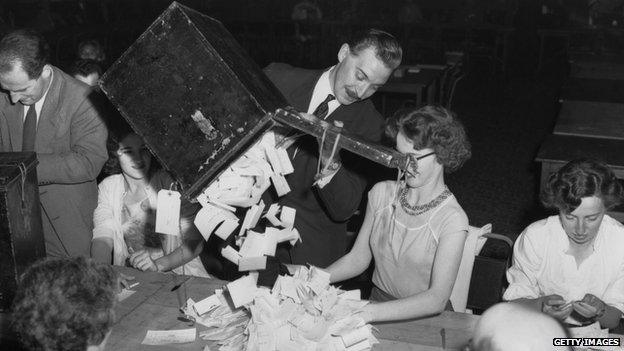
Hustings, ballot boxes, election broadcasts, the leaders of two mighty parties battling it out for the "keys to Number 10". Why does so much about the general election seem to belong to a bygone era?
They didn't have Twitter feeds in the 1950s. Or rolling news. Or televised election debates. In fact, for much of the decade the BBC was banned from reporting from the campaign trail entirely. The party leaders would instead be invited to address the nation on radio and television in lengthy party election broadcasts.
Yet for many observers, British general elections have the feel of an historical re-enactment about them.
It is not just the draughty church halls and arcane terminology (why are public meetings called hustings? What do "returning officers" do between elections?)
It is the reliance on tried-and-tested campaigning methods - stuffing leaflets into envelopes, knocking on doors, filling in canvassing returns, touring the streets with a loud-hailer van, "getting the vote out" by driving recalcitrant supporters to the nearest polling station.
And, of course, the drama of election night itself - candidates anxiously pacing the hall as the ballot papers pile up on trestle tables, local dignitaries stepping up to the microphone in the early hours to announce the results.
'Incredibly romantic'
For traditionalists, these rites and rituals are an almost mystical affirmation of British Parliamentary democracy.
Others wonder if the whole thing is a bit past its sell-by date.
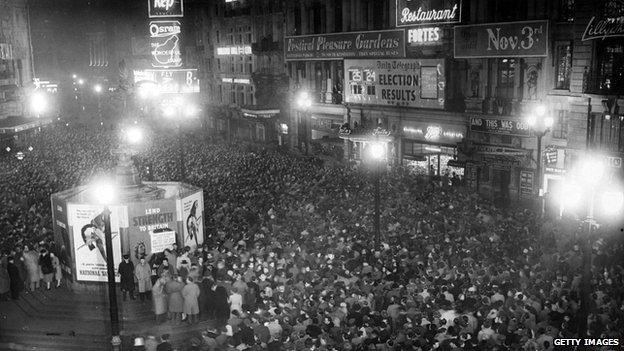
Crowds in Piccadilly Circus watch the 1951 election results
"The voting system is incredibly romantic," Conservative MP Robert Halfon argued last year in a speech, external.
"We have the old-fashioned pencil and the beautiful, black, dented, old-fashioned ballot box.
"We mark a cross on a piece of paper and stick it in the ballot box, which is anachronistic and stuck in the previous century.
"The public have moved on from such behaviour, which is why we have seen such a drop in voter participation and a huge increase in people who want to vote by post."
Smoky pubs
Many election traditions stretch way back before the 1950s.
But it was that decade when the traditional way of doing things arguably reached its high-water mark.
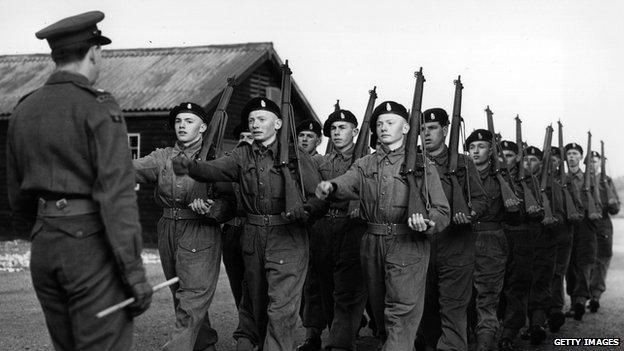
National service was a part of growing up for young men
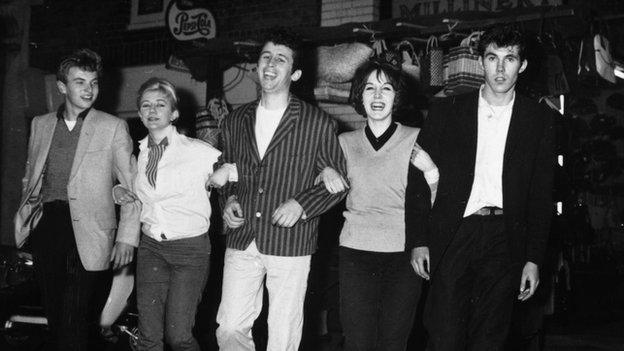
But it was still possible to have fun
The biggest general election turnout in British history - in percentage terms - came in 1950, with 83.9% of the electorate casting a ballot. That compares to 65.1% in 2010.
Of those who took part in the 1950 election, an astonishing 89.6% voted for one of the two big parties. The Labour Party clung on to power by just five seats, but would be ejected by the Conservatives the following year, when Winston Churchill won his only general election.
Watching footage of cheering election night crowds in Piccadilly Circus - or huddled around the wireless in smoky pubs - it is easy to think of the fifties as some kind of golden age for British democracy, when politics was at the very heart of national life.
Britain was a very different country back then. Wartime food rationing was still in force in the first part of the decade, with each person limited to 1oz of cheese, 2oz of tea, 2oz of jam spread, 4oz of bacon or ham and so on per week.
'Garden cities'
Television was in its infancy, men aged under 21 had to join the armed forces for two years of "national service", and luxuries like foreign holidays and cars were for the privileged few.
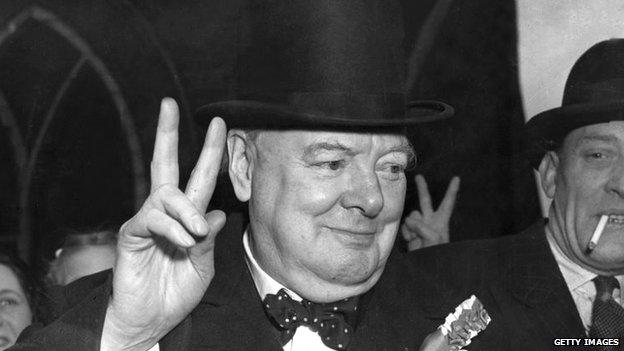
Wartime leader Winston Churchill returned to power in 1951
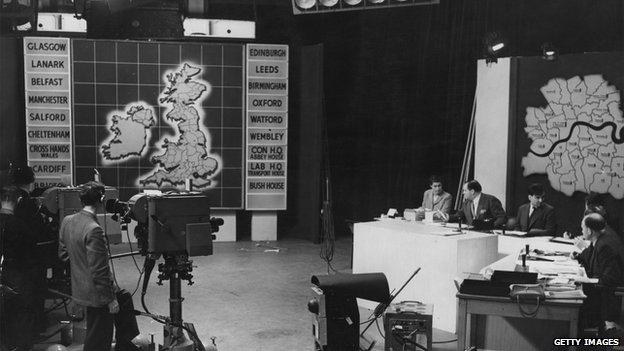
Richard Dimbleby presents the BBC's 1955 election night programme
Change was coming, with the birth of rock and roll, the launch of commercial television and the growth of hire purchase heralding a less conformist, more consumerist, society - yet Britain was still a grey, austere country compared to today. And politics was different too.
However, strip away contemporary concerns about the future of the British Empire or the nationalisation of industry, and the election campaigns of the two big parties in the 1950s have a very familiar ring to them.
A recently rediscovered pamphlet from the 1950 election, external shows that Clement Attlee's Labour Party fought the campaign on a platform of protecting the NHS, increasing living standards and taxing the rich. There is also a promise to alleviate the housing crisis by building new "garden cities".
The 1950 Conservative manifesto, external accused Attlee's Labour government of wrecking the economy and being soft on welfare claimants.
'Brand loyalty'
The difference now is that the two biggest parties can no longer rely on vast voting blocs that divide neatly along class lines, as they could in the 1950s.
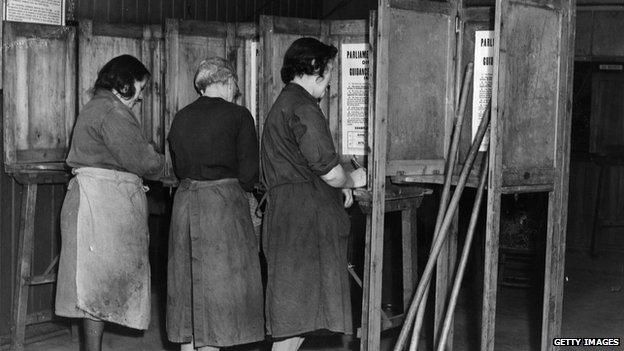
Polling booths are the same now as in the 1950s
"Working class people, with a few exceptions, thought of themselves as Labour. Middle class people thought of themselves as Conservative," says Professor Paul Whiteley, of Essex University.
"Brand loyalty" in British politics began to decline in the 1960s, with the loosening up of rigid class barriers, says Prof Whitely, but he believes it has now reached a "tipping point".
"I think we are entering an era of very volatile politics, greater electoral volatility and greater volatility in the polls," he says.

Find out more
For those puzzled by some of the general election terminology, the BBC's Newsbeat team has put together a handy jargon buster. There is also a longer Frequently Asked Questions piece, which covers everything you need to know about casting a vote on 7 May.
You can also watch classic clips from previous election campaigns, with our Conservative, external, Labour, external and Liberal Democrat, external Party Election Broadcast timelines.

The emergence of smaller parties, so vividly demonstrated by Thursday's seven-way TV election debate, has given voters more choice than ever.
It is a long way from the ultra-stable and predictable world of 1950s politics.
'Super-hung'
Yet the big two parties still have to present the election as a binary choice between their respective leaders.
If they fail to convince enough voters that this is the case then the next Parliament is likely to be "super-hung," says Prof Whiteley, "far more hung than it was in 2010" - and we could be looking at years of instability and weak minority governments. It might not even be possible to form a stable coalition.
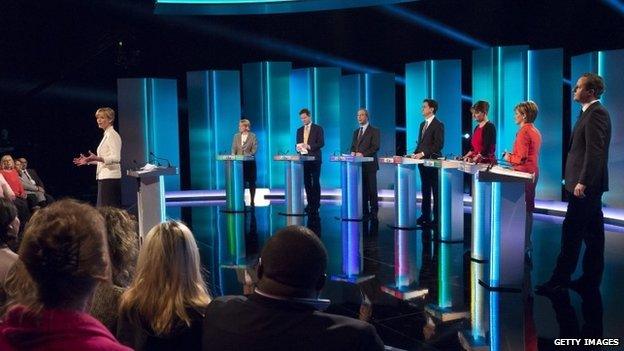
Not everything has stayed the same
One result, he argues, could be that demands for a change in the voting system might return with a vengeance.
"After the AV referendum, we all thought it had been called off for a generation but in the light of what is happening in this election I think it is going to arise again."
Others argue that it is the mechanics of voting itself that needs to change if Britain's creaking democracy is to receive a transfusion of new blood.
One of the biggest changes that has taken place since the 1950s has been the dramatic decline in young people voting in general elections.
Areeq Chowdhury, the 22-year-old chief executive of campaign group Webroots Democracy, says the very process of voting itself - trudging along to a local primary school or church hall to cast a ballot - is "alien to the way they live their lives".
"It is almost getting ridiculous, it is so outdated," he adds.
Quaint rituals
Webroots campaigns for the introduction of online voting, external, claiming in a report last month that it would increase turnout by nine million and save taxpayers £12m per general election.
The Speaker's Commission on Digital Democracy, external, whose members include Robert Halfon, have also backed the idea of online voting.
Traditionalists would argue that the British electoral system, for all its quirks and quaint rituals, has endured over the years for one simple reason: It works.
Putting a cross on a ballot paper might not be as exciting or convenient as touching an icon on a smart phone app, but it is relatively foolproof - and plenty of young people managed to do it in last year's Scottish referendum.
The two-party system might yet re-assert itself, as voters decide they prefer the stability of majority governments to the messy compromises of coalition.
And calls to bring the voting system into the 21st Century have so far fallen on deaf ears.
It looks like we might be reliving the 1950s at election time for a good while yet.

Some of your comments:
James, Derbyshire: I think the traditional method of voting has two very important benefits. Firstly, and most importantly, it prevents abuse of the system. Any system that allows voting at home (including postal voting) could lead to people into being pressured, forced or bribed into voting for someone they wouldn't want to vote for in a free and fair election. Secondly, the act of going to a polling station means that candidates have to motivate you to get off your comfy chair - you are less likely to vote on a whim. Other small, additional benefits include the act of going to the ballot box links you to the community you live in and gives you a tangible, historical link to the earliest days of democracy and those who fought for it.
Graeme Houston from Kilbirnie, Ayrshire: It is high time that the voting system is changed to direct democracy with a people's council, a proportional voting system that the whole county is the constituency, and direct election of the Prime Minster and Cabinet! and Direct Election of Head of State
Malcolm Matthews from Southampton: Moving to online voting would open the system up to fraud. There is already a significant level of fraud from postal voting.
Perhaps schools should have polling stations set up the day after elections, before the ballot boxes go back into storage, to promote the idea of voting.
Voting should be seen as the solemn duty it is, not something to do as you update your status and play Candy Crush. Keeping the traditional way is a good thing.
Dave H from America: I am happy for the existing system to continue in pretty much its present form. It's a lot harder to fiddle than any online system, and has a much better audit trail behind it than a system using electronic voting machines which have had doubts cast upon their reliability in the US.
Even postal voting is lacking certain safeguards, as various recent occurrences of fraud have shown.
Chris Coldwell from Lancaster, Lancs: Not to mention the archaic rules that mean an entire school has to close so that one room can be used for polling.
Tim Fell from York: Why, if something can resemble a point in the past, does it receive the negative labels of 'arcane', 'bygone', 'anachronistic'? Why is the past always denigrated for the sake of denigration and no other?
I am in my early 30s (relatively 'young' then) I have always voted at every election, big or small, I have always engaged with politics, and always found it relevant. Why? Because I choose to. I realise it is important, and I have a responsibility to do so.
I don't ignore it, and blame someone else for not making it easier for me, I make the effort myself. Maybe it's not politics that is broken, but the modern lives it serves.
Paul from Birmingham: Until we change the way we elect the government, voting is a waste of time for me as where I live the incumbent MP has a massive majority so my vote is pointless as I don't like that party.
They must find a way for elections to only count the total votes cast for all parties and then decide on a way of where each MP represents a constituency - people often have no idea who their MP is but will tell you which party they support - go figure.....
Brian O'Neil from Paisley: Why did your reporter spoil a decent article by regurgitating the well-worn, and now completely inaccurate adage, that majority governments are stable and coalitions are messy?
Is the current Parliament not reaching the end of a full 5-year term in what must be possibly the longest serving parliament in modern times unfettered by majority parties calling early elections for political gain with no heed to what is in the best interests of the country.
Stop this ridicule of minority government. It's the closest thing we have had to democracy for two centuries of the modern franchise.
Nigel Maglione, Wheathampstead: I think the whole democratic process is stuck in a bygone era. I have no choice about my MP as I am in a safe seat. He was chosen by a small cabal of his party and decked out with a party label for public consumption.
As Scotland clearly showed, when there is something to vote for people will vote. We have to get a system where each vote counts and MPs are genuinely accountable to the voters in all constituencies, not just marginal seats. We need them accountable to the people who vote for them not their parties.
The reality is that we have a coalition every election as both Conservative and Labour are massive coalitions with a wide range of opinion. Only we never get to choose which part of the coalition we want!
Christopher Martin, Glasgow: It's time to leave the ballot box and pencil behind. The world is moving on with the invention of social media and the drive towards electronic 24 communications. We should be looking at using these platforms to encourage voting, especially amongst the younger generations of voters. If people can vote from their phones or tablets then they would obviously be more inclined to vote rather than having to travel to their old primary school or scout hall.
Neil Paxton: Another danger is that one of the main parties is delivered a working majority on 1/3 of the vote cast, which could be around 20% of the population decides the fate of the other 80%. In a highly divided vote the largest minority could dominate the commons. Not good for democracy.
Lesley Varlinden, Hong Kong: Given that voting online is still not available, without doubt it is stuck in the past. I believe this resistance to update has isolated many younger generations from voting. From registration to the final vote the process remains outdated. This lack of change and modernisation has helped perpetuate low turnout for many years; and low turnout benefits only the major parties fighting for number 10; it most certainly does not benefit the nation or democracy.
Michael, Devon: The first election I could participate in was the 2014 European Elections and I had absolutely no problem with the system which was take your voting card to the assigned polling station (which was a village hall), register, and then put an 'x' in the box you wanted. It was simple and easy. Better that than trying to implement an online system where everyone would have to try and remember various IDs and passwords just so that they can vote.
I don't see the benefit of making it harder for the older generations to vote just so that a few young people don't have to walk a few hundred meters to a polling station as they can't currently be bothered to.
Peter Webb, Godalming, Surrey: It has been found and recorded by the H of C Political & Constitutional Select Committee Inquiry into Voter Engagement that poor turnout is not due to apathy but a lack of awareness and information on which to vote, coupled with a lack of belief in elections as presented.
The solution lies in the simple words "to give an account". In all other social and industrial constitutionally organised bodies there is a requirement and statutory impregnation with varying degrees of formality to discharge accountability for performance, and propose for electoral renewal. Government practice remains medieval in this respect.
Maurice Puttock, Iver, Bucks: The present system would seem to be outdated but having voting online would be wide open to massive fraud. We would all be told it was perfectly safe to have one person, one vote, but there are ways around it. No party could guarantee a safe system. Can you imagine having 50 or 60 MPs who do not have Britain's interests at heart. Keep the present system. It may be outmoded but far safer.
James Trim, Ludford, Lincs: There may be more parties to choose from but they will make no difference to our supposed democratic process until we have a proper Proportional Representative election system with seats being apportioned in direct relationship to the percentage of votes cast for any party nationally.
At the moment the outcome of the election is decided by the results in marginal constituencies, about a third of the total, with the rest being so called "safe seats".
How can this be democratic when the outcome of a government is decided this way? Voters in safe seat constituencies who oppose the incumbent party, it does not matter which party it is, really have no say in the election and their vote is irrelevant.
I realise that this may lead to more coalition governments but I am not sure that this is bad thing because it may lead to government that benefits the whole of society rather than tending to benefit of their vested interests.
Robin Arnold, Wolverhampton, UK: I think it's absolutely crazy that politicians and the media complain about low voter turnout, and then require people to 'register' to be able to vote, and let that register be used for other things such as jury service or debt collection or who knows what. The electoral roll ought to be completely absolutely confidential. If I'm a British citizen with a date of birth and a national insurance number, why can't I vote, why do I need to register?
Susan Attwood, Newport: The British voting system must change - we must vote for the next prime minister not for a local candidate - the man in charge is the one to bring to power.
Iain: For a modern nation, trying to compete in the global technology marketplace, and encouraging our youth to embrace modern tech and coding, the electoral system is as archaic as the (albeit beautiful) Westminster building which houses our government.
When you think of all the equipment, such as temporary polling booths, ballot boxes, paper and pens, coupled with the time spend administering both voting and counting of votes, I am amazed that the estimated increase in costs only equate to £12 million.
Personally, I think it is a ridiculous process in this day and age, and indicates just how out of touch the political scene is with modern day society, which goes some way to justify the poor turnout figures at the polls.
Also, when you get people such as Joey Essex appearing on 'This Week', displaying complete and embarrassing ignorance of the electoral system of the country in which he resides, you do come to the conclusion that a radical rethink is long overdue.
David Jackson, Marple, Cheshire: I don't think elections are stuck in the 1950s. I wish they were. Elections would be a great deal more democratic if we got rid of televised debates, concentration on the leaders and pointless attempts to 'update' the process.
The extension of postal voting is also a disaster, bringing back as it does the buying and selling of votes. Apart from those who are unable to get there, all voting should be done by marking a ballot paper in the polling station. This is the very essence of the election.
I suggest we ban all television and internet campaigning and return to all campaigning being done in person. Get rid of the party names on the ballot paper too. We are voting for individuals, not parties.